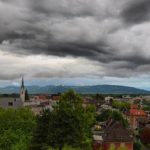Architektur | Kultur
Marktplatz / Market Square EN
-
Settlement of Torro
The name “Dornbirn“ is of Alemannic origin and is a testament to the immigration of Germanic settlers. A document from St. Gall from the year 895 first mentions “Torrinpuirron“, which would later become Dornbirn. While ‚Torrin‘ is derived from the Germanic name “Torro“, ‚puirron‘ simply translates as „settlement“. Thus, Dornbirn was founded as the ‚Settlement of Torro‘.
Thus we are situated in an Allemanic settlement which was founded around the year 500, just after the rule by the Romans had ended. The Alemanns settled in the Swiss region Thurgau, in the north of Vorarlberg and in Upper Swabia; nevertheless, the majority of the tribe stayed north of Lake Constance.
They founded their own settlements without forcing out the local population. At the time Vorarlberg was only populated in areas which offered ideal conditions for agriculture: the area around Bregenz, areas of the eastern Rhine Valley, the area around Götzis, the area around Bludenz, and the Walgau valley. The greater part of the state – the Bregenz Forest, the Klostertal and Montafon valleys, the side valleys of Walgau, as well as Tannberg – were and would remain unpopulated for quite some time. Back then, what is now Vorarlberg was part of Theoderich’s Ostrogoth kingdom, which had its center in Italy. In the 6th century the Franks took over the power.
Two aspects of Alemannic culture left a permanent mark during the 1500 year history of settlement: the language and the economy. The economy was characterized by village cooperatives, which shared agricultural areas. Fields, pastures, forests, rivers and roads were maintained and used in cooperation. Private ownership of fields, pastures and forests developed much later when areas were divided up between different people.
There are three Alemannic dialects: Alsatian, Swiss German and the Alemannic German of Vorarlberg. Today, approximately 10 million people speak one of these dialects. For example, the German ‘Haus’ (pronounced: house) is pronounced ‘Huus’ (pronounced: hoose) in the Alemannic dialect of Dornbirn. A characteristic feature of the Alemannic dialect is the frequent use of diminutive forms: Häuschen – Hüüsle meaning: little houseListen to one or two stanzas of the humorous song “Doarobiorar Jungfara”, which is sung in the Dornbirn dialect and is about two virgins and their peculiarities.
Lyrics (rough translation)
Hello! Here we come, going straight ahead, people might say: “Oh my, what
kind of girls are they?” Yes, if they don’t recognize us in our clothes right away
we’ll be honest and direct about who we are. We’re two virgins,
two virgins from Dornbirn, and you can tell this from far away. [stanza 1]If you look at the latest fashion in the shops, the clothes are thin
there’s hardly any fabric on them. But we wear different clothes, they’re firm, they’re shiny,
they’re certainly going to last for decades, und they cover you completely. It’s what fits us virgins,
us virgins from Dornbirn, it fits us the best. [stanza 2]We don’t smoke, we don’t drink, sometimes we swear, we don’t drink, sometimes we swear,
we love the Dornbirn way and we love the Dornbirn costume, we don’t need
lipstick, no lido und no sports, we live a decent and happy life and we only need one word:
we’re two virgins, two virgins from Dornbirn, and we don’t care what others do. [stanza 3]We like to work, we like to eat bread, bacon, coffee, Riebel (traditional food from Vorarlberg), soup
yes, it’s delicious. It gives you courage and strength, it keeps you tough and healthy
it makes you enjoy life and you’re full of desire at all times. Like us two virgins,
two virgins from Dornbirn, we start everyday with delight. [stanza 4]Now we’ve heard people say we’re looking for a husband, that it was just to please the men
that on Sundays we wear our costumes. It couldn’t be further from the truth, but if you want us to,
we’ll say loud and clear what we think. We’re going to stay virgins, old virgins from
Dornbirn, we’ll never have husbands as long as we live. [stanza5]But if there were a man, who’d like to win over one of us, we’re going to see,
what to do next. And if it doesn’t work out, we’ll send them away,
because dying unmarried, as people say, isn’t necessarily a waste. And Saint Peter says:
“Well well, here we have two virgins, we’ll put them right at the front of the line to heaven. [stanza 6]stadtarchiv.dornbirn.at/menschenspuren
www.vielfaltenarchiv.at/menschenspurenPräsentiert von: Amt der Vorarlberger Landesregierung - Kultur
Autor: Stadtarchiv Dornbirn -
Anfahrt:
Anfahrtsplaner -



